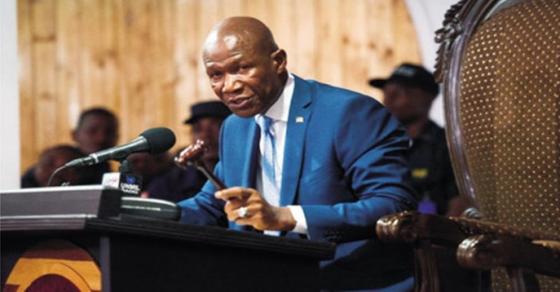Liberia's Election: Speaker Bhofal Chambers Toppled by Newcomer

`Speaker Bhofal Chambers.
….Former student leader, Anthony Williams, ends Speaker Chambers’ 18-year Political Dominance in Pleebo Sodoken
Bhofal Chambers, the once all-powerful Speaker of the House of Representatives, appeared to have lost his legislative seat as he trailed his main rival, Anthony Williams, a former student leader at the state-run University of Liberia.
With 96.49 percent of the total votes counted for Chamber's Maryland County Electoral District Two, according to data from the National Elections Commission, the Speaker is trailing Williams, a political newcomer, by a margin of 98 votes.
Williams has accumulated 8,017 votes while Chambers has 7,919, as of the electoral body's data from October 16. However, the final tally sheet from the Magisterial Office in Harper, Maryland County, shows that Williams has defeated Chambers with 8,158 votes against 8,122—a difference of 36 votes.
Chambers' loss comes as he had been seeking his fourth consecutive win since 2005, making him one of the longest-serving legislators in the post-war history of Liberia.
The defeat marks an unexpected turn of events in his illustrious political career. With a record-breaking 18 years of service in the national legislature, including six years as Speaker of the 54th national legislature, Chambers has been a prominent figure in legislative politics in Maryland County. In a previous attempt, he contested for the Senate to represent the county at the upper chambers of the national legislature but faced defeat in 2014.
During his opposition days, Chambers was known for being vocal against corruption and bad governance, as well as some of the policies of former President Ellen Johnson Sirleaf. He even refused to shake hands with Sirleaf at a state function, sparking mixed reactions from the public.
However, critics of Chambers argue that his tenure as Speaker under the ruling Coalition for Democratic Change fell short of what he had previously advocated for during his time in the opposition. They claim that he prioritized maintaining a close relationship with the executive branch under President Weah and lacked a history of opposing or taking a radical stance against the executive's excesses.
Known for his influence and ability to navigate his way through complex webs to ensure that the President's will is done, the Speaker's defeat has sent shockwaves through the ruling party but comes as a joy to many opposition figures.
In contrast, Williams, whose name was unfamiliar to many prior to the elections, challenged the Speaker's dominance, bringing him to his knees. The former student leader is reported to have captured the attention and support of a significant portion of the electorate in Pleebo Sodoken. He based his campaign on the idea of giving power back to the people of his district. With a strong following among the youth, Williams highlighted the district's underdevelopment and promised to address it if elected, tapping into voter frustrations and the desire for change.
"We cannot talk about three concession agreements in the district when we don't have public latrines for the people, clean water, better schools, and healthcare," Williams said during the campaign. "We will address these things when we are elected by renegotiating for a better offer for our people."
"We should be asking Mr. Bhofal Chambers what he has done with our constituency's money, which he has been collecting besides his salary. We should be asking him for his stewardship. What has he done for our people and the district?
"This is a social contract I am entering with you. Give me power, let me give you the basic necessities you need for the district. Give me power, let me renegotiate for your concessions, give me power for your roads, better health and education systems, let me give you better representation," Williams said in a campaign speech posted online.
Williams' victory highlights the evolving political landscape within the country—as the outcomes of these elections, which will see a vast majority of the current lawmakers not returning, serve as a symbol of the shifting dynamics within the Liberian political space and underscore the importance of citizens' engagement in shaping the country's future.
Out of the top three members of the leadership of the Lower House, only a single person, Deputy Speaker and Grand Kru County District #2, J. Fonati Koffa, will make his way back to the Capitol.
The other two, in the persons of Chambers, as well as Acarous Gray, Montserrado County District #8 Representative and Chairman of the House's Committee on Executive, may likely not return.
